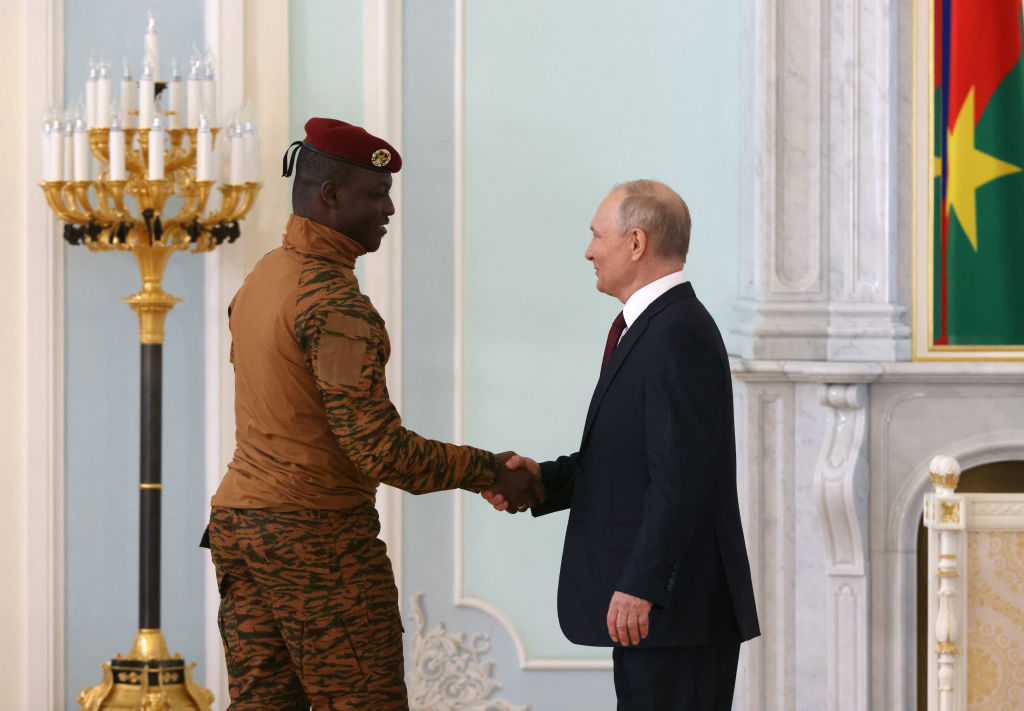ADF STAFF
New data is shedding light on how Burkina Faso’s security has deteriorated in the two years since the military took power in a coup.
Burkina Faso is now the most terrorism-affected country in the world, according to the Global Terrorism Index. The United Nations has reported that more than 20,000 Burkinabe have died and more than 3 million people forced from their homes since the country’s insurgency began in 2015.
Last year, more than half of the deaths due to militant Islamist violence in the Sahel occurred in Burkina Faso, according to the Africa Center for Strategic Studies.
Violence killed more than 8,400 Burkinabe in 2023, double the deaths from the previous year, according to the Norwegian Refugee Council. By the end of 2023, about 2 million Burkinabe civilians were trapped in 36 blockaded towns across the country, about half of which is outside government control.
As of September, more than 6,100 Burkinabe, many of them civilians, were killed by violence, according to Armed Conflict Location and Event Data (ACLED) analysis. The violence is especially intense in border areas in each region,notably with Côte d’Ivoire, Niger and Togo.
One of the deadliest attacks in Africa in years happened in August, when the al-Qaida-affiliated Jama’at Nusrat al-Islam wal-Muslimin (JNIM) rode into the remote town of Barsalogho on motorcycles and slaughtered up to 600 people, including women and children, according to a French security report.
“Large-scale deadly attacks (at least a hundred deaths) against civilian populations or defense and security forces have been occurring for several weeks at a rate that seems unsustainable for the government, which no longer really has a military strategy to offer and whose propaganda discourse seems out of breath and ideas,” the report said.
The Islamic State group (IS) also operates in Burkina Faso, but JNIM is the most active terror group in the country.
JNIM also targets security forces, armed groups, rival terror organizations and government infrastructure such as water storage and power plants. The group acts in the place of government in areas it controls, offering amenities to locals, signing agreements with local leaders and recruiting from the population.
The group funds itself through kidnapping for ransom, collecting taxes, smuggling weapons, and extorting drug and human traffickers.
“They are married into local populations, and it’s hard for the military to find them because they blend in quite quickly,” Ulf Laessing, head of the Sahel program at Germany’s Konrad Adenauer Foundation, told Al Jazeera. “That’s part of the frustration for the Burkina Faso army, that they can’t fight them.”
Burkinabe soldiers and Russian mercenaries also target civilians. In February, security forces executed 223 civilians, including at least 56 children, in two northern villages, according to Human Rights Watch (HRW), which reported that the massacre appeared to be part of a military campaign against civilians accused of collaborating with armed groups.
Tirana Hassan, HRW’s executive director, denounced the killings as “just the latest mass killings of civilians by the Burkina Faso military in their counterinsurgency operations.”
“The repeated failure of the Burkinabe authorities to prevent and investigate such atrocities underlines why international assistance is critical to support a credible investigation into possible crimes against humanity,” Hassan told Al Jazeera.
Junta leader Capt. Ibrahim Traoré pledged to return to constitutional order by this year when he took power, but he extended the transitional period by five years in June, citing security issues.
The ongoing violence has led to severe humanitarian issues. The European Commission estimates that 6.3 million people in Burkina Faso need humanitarian assistance; that is 27% of the country’s population. However, relief agencies have struggled to deliver aid in blockaded areas.
Due to conflict, more than 2.7 million Burkinabe also will experience crisis levels of food insecurity, according to the March 2024 Cadre Harmonise, which analyzes food and nutrition insecurity in West Africa and the Sahel.
Additionally, more than 2 million Burkinabe are internally displaced due to violence, the European Commission reported,
“Since we arrived, we have not left,” Howa Mama, an internally displaced person in the northeast town of Dori, told Al Jazeera. “It’s too dangerous to return home. Life in the camps is too dangerous, life in the camp is hard but we have no choice but just to survive.”
The situation has Burkina Faso caught in what African affairs expert Teresa Nogueira Pinto has dubbed a “coup trap,” meaning that another coup is possible as issues related to the original one proliferate.
Writing for Geopolitical Intelligence Services, Pinto said she believes it is likely that the humanitarian issues and political instability will persist and that insurgent groups will continue expanding their reach and blockade more areas.
“Despite the junta’s harsh suppression of any opposition, President Traoré’s numerous adversaries in the military, especially among senior officers, coupled with pervasive violence and fragmentation, make another coup conceivable,” Pinto wrote.

